COVID-19 Project
This digital archive explores the impacts of the COVID-19 pandemic on U.S. Muslims’ physical and mental well-being, religiosity and spirituality, collective cultural shifts, economic health, and coping strategies. The archive also examines how these interplay with gender, social identity, and justice across the diverse Muslim communities. By collecting data and personal experiences from Muslim community members and religious leaders throughout the country, AMWRRI seeks to discuss the wide variety of ways in which the pandemic has changed daily practices and beliefs.
-
 Interview Hayat (name changed for confidentiality) is a first-generation immigrant from city of Palestine, now living within the Milwaukee, Wisconsin area. She first came to America, initially New York City, in 1980s, as an 18-year-old girl, one year after her father had left Palestine for New York. Hayat was a graduate of a Catholic High School in Jerusalem, Palestine. Her main purpose behind her immigration was for additional education after high school, and her father left to find work and make money in America and send it back to his family back home. Their immigration plan was meant to be temporary, however, this was no longer an option anymore, as Netanyahu, who was the mayor of Jerusalem at the time, had taken away Hayat and her father’s residency. She has lived in Milwaukee with her three children since and she is a high school math teacher in Milwaukee. In this interview, Hayat discusses the political trauma her family endured as Palestinians from Jerusalem and how it affected them financially, giving them no choice, but to leave. She also discusses the struggles of people a Palestinian in exile, but how her close relationship with her father supported her through these hardships. The most recent hardship of her life has been the COVID-19 pandemic, as it’s affected everybody, but especially her family financially.
Interview Hayat (name changed for confidentiality) is a first-generation immigrant from city of Palestine, now living within the Milwaukee, Wisconsin area. She first came to America, initially New York City, in 1980s, as an 18-year-old girl, one year after her father had left Palestine for New York. Hayat was a graduate of a Catholic High School in Jerusalem, Palestine. Her main purpose behind her immigration was for additional education after high school, and her father left to find work and make money in America and send it back to his family back home. Their immigration plan was meant to be temporary, however, this was no longer an option anymore, as Netanyahu, who was the mayor of Jerusalem at the time, had taken away Hayat and her father’s residency. She has lived in Milwaukee with her three children since and she is a high school math teacher in Milwaukee. In this interview, Hayat discusses the political trauma her family endured as Palestinians from Jerusalem and how it affected them financially, giving them no choice, but to leave. She also discusses the struggles of people a Palestinian in exile, but how her close relationship with her father supported her through these hardships. The most recent hardship of her life has been the COVID-19 pandemic, as it’s affected everybody, but especially her family financially. -
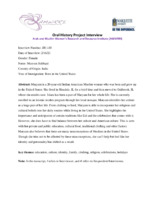 Interview Maryam is a 20-year-old Indian American Muslim woman who was born and grew up in the United States. She lived in Hinsdale, IL for a brief time and then moved to Oakbrook, IL where she resides now. Islam has been a part of Maryam for her whole life. She is currently enrolled in an Islamic studies program through her local mosque. Maryam identifies her culture as a huge part of her life. From clothing to food, Maryam is able to incorporate her religious and cultural beliefs into her daily routine while living in the United States. She highlights the importance and anticipation of certain traditions like Eid and the celebration that comes with it. However, she does have to find balance between her culture and American culture. This is seen with her private and public education, cultural food, traditional clothing and other factors. Maryam also believes that there are many misconceptions of Muslims in the United States. Though she tries not to be affected by these misconceptions, she can’t help but feel like her identity and personality has shifted as a result.
Interview Maryam is a 20-year-old Indian American Muslim woman who was born and grew up in the United States. She lived in Hinsdale, IL for a brief time and then moved to Oakbrook, IL where she resides now. Islam has been a part of Maryam for her whole life. She is currently enrolled in an Islamic studies program through her local mosque. Maryam identifies her culture as a huge part of her life. From clothing to food, Maryam is able to incorporate her religious and cultural beliefs into her daily routine while living in the United States. She highlights the importance and anticipation of certain traditions like Eid and the celebration that comes with it. However, she does have to find balance between her culture and American culture. This is seen with her private and public education, cultural food, traditional clothing and other factors. Maryam also believes that there are many misconceptions of Muslims in the United States. Though she tries not to be affected by these misconceptions, she can’t help but feel like her identity and personality has shifted as a result. -
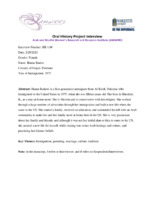 Interview Hanan Badawi is a first-generation immigrant from Al-Bireh, Palestine who immigrated to the United States in 1975, when she was fifteen years old. She lives in Hinsdale, IL, as a stay-at-home mom. She is Muslim and is conservative with her religion. She worked through a large number of adversities through her immigration and built a new life when she came to the US. She started a family, received an education, and surrounded herself with an Arab community to make her and her family more at home here in the US. She is very passionate about her family and friends, and although it was not her initial plan or idea to come to the US, she created a new life for herself, while staying true to her Arab heritage and culture, and practicing her Islamic beliefs.
Interview Hanan Badawi is a first-generation immigrant from Al-Bireh, Palestine who immigrated to the United States in 1975, when she was fifteen years old. She lives in Hinsdale, IL, as a stay-at-home mom. She is Muslim and is conservative with her religion. She worked through a large number of adversities through her immigration and built a new life when she came to the US. She started a family, received an education, and surrounded herself with an Arab community to make her and her family more at home here in the US. She is very passionate about her family and friends, and although it was not her initial plan or idea to come to the US, she created a new life for herself, while staying true to her Arab heritage and culture, and practicing her Islamic beliefs. -
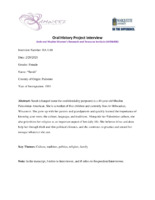 Interview Sarah (changed name for confidentiality purposes) is a 49-year-old Muslim Palestinian-American. She is a mother of five children and currently lives in Milwaukee, Wisconsin. She grew up with her parents and grandparents and quickly learned the importance of knowing your roots: the culture, language, and traditions. Alongside her Palestinian culture, she also prioritizes her religion as an important aspect of her daily life. She believes it has and does help her through thick and thin political climates, and she continues to practice and attend her mosque whenever she can.
Interview Sarah (changed name for confidentiality purposes) is a 49-year-old Muslim Palestinian-American. She is a mother of five children and currently lives in Milwaukee, Wisconsin. She grew up with her parents and grandparents and quickly learned the importance of knowing your roots: the culture, language, and traditions. Alongside her Palestinian culture, she also prioritizes her religion as an important aspect of her daily life. She believes it has and does help her through thick and thin political climates, and she continues to practice and attend her mosque whenever she can. -
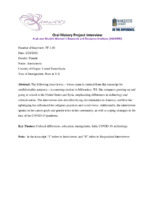 Interview The following interviewee – whose name is omitted from this transcript for confidentiality purposes – is a nursing student in Milwaukee, WI. She compares growing up and going to school in the United States and Syria, emphasizing differences in technology and cultural norms. The interviewee also describes facing discrimination in America, and how her upbringing has influenced her religious practices and social views. Additionally, the interviewee speaks on her career goals and gender roles in her community, as well as coping strategies in the face of the COVID-19 pandemic.
Interview The following interviewee – whose name is omitted from this transcript for confidentiality purposes – is a nursing student in Milwaukee, WI. She compares growing up and going to school in the United States and Syria, emphasizing differences in technology and cultural norms. The interviewee also describes facing discrimination in America, and how her upbringing has influenced her religious practices and social views. Additionally, the interviewee speaks on her career goals and gender roles in her community, as well as coping strategies in the face of the COVID-19 pandemic. -
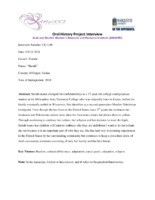 Interview Sariah (name changed for confidentiality) is a 17-year-old college undergraduate student at the Milwaukee Area Technical College who was originally born in Jordan, before her family eventually settled in Wisconsin. She identifies as a second-generation Muslim Palestinian immigrant. Even though she has lived in the United States since 2nd grade she embraces her Jordanian and Palestinian culture more than the American culture but allows them to collide. Through continuing to embrace her culture, her religion and her decision to wear the hijab, Sariah hopes her children will learn to embrace who they are and doesn’t want to let her culture die out because it is an important part of who they are. She has had very welcoming experiences in the United States by her surrounding community but continues to keep a close-knit circle of Arab community members consisting of only her family and her best friend.
Interview Sariah (name changed for confidentiality) is a 17-year-old college undergraduate student at the Milwaukee Area Technical College who was originally born in Jordan, before her family eventually settled in Wisconsin. She identifies as a second-generation Muslim Palestinian immigrant. Even though she has lived in the United States since 2nd grade she embraces her Jordanian and Palestinian culture more than the American culture but allows them to collide. Through continuing to embrace her culture, her religion and her decision to wear the hijab, Sariah hopes her children will learn to embrace who they are and doesn’t want to let her culture die out because it is an important part of who they are. She has had very welcoming experiences in the United States by her surrounding community but continues to keep a close-knit circle of Arab community members consisting of only her family and her best friend. -
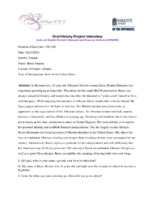 Interview In the interview, 25-year-old Albanian-Muslim woman Rreze Ibraimi Discusses her experience growing up in Janesville, Wisconsin. In this small Mid-Western town, Rreze was always viewed differently and reveals that she often felt the need to “white-wash” herself to fit in with her peers. While enjoying her summers in Albania, Rreze would often visit her friends My Space pages and miss her life back in America. Her Muslim identity proved not to be as oppressive as the expectations of her Albanian culture. An Albanian woman routinely marries, becomes a housewife, and has children at a young age. Breaking with tradition, Rreze has chosen not to marry at this time, and pursue a career in Dental Hygiene. Her main priority is to express her personal identity and establish financial independence. Due her largely secular lifestyle, Rreze illuminates the broad spectrum of Muslim identities in the United States. She shares her love of traditional Albanian clothing and recipes, thus revealing obvious love and respect for her culture. Alternatively, Rreze expresses gratitude for the independence and self-sufficiency that her American way of life has given her. She can enjoy Byrek (a traditional Albanian filo pie) as well as a good Cheeseburger. Rreze exemplifies the meaning of having both roots and wings.
Interview In the interview, 25-year-old Albanian-Muslim woman Rreze Ibraimi Discusses her experience growing up in Janesville, Wisconsin. In this small Mid-Western town, Rreze was always viewed differently and reveals that she often felt the need to “white-wash” herself to fit in with her peers. While enjoying her summers in Albania, Rreze would often visit her friends My Space pages and miss her life back in America. Her Muslim identity proved not to be as oppressive as the expectations of her Albanian culture. An Albanian woman routinely marries, becomes a housewife, and has children at a young age. Breaking with tradition, Rreze has chosen not to marry at this time, and pursue a career in Dental Hygiene. Her main priority is to express her personal identity and establish financial independence. Due her largely secular lifestyle, Rreze illuminates the broad spectrum of Muslim identities in the United States. She shares her love of traditional Albanian clothing and recipes, thus revealing obvious love and respect for her culture. Alternatively, Rreze expresses gratitude for the independence and self-sufficiency that her American way of life has given her. She can enjoy Byrek (a traditional Albanian filo pie) as well as a good Cheeseburger. Rreze exemplifies the meaning of having both roots and wings. -
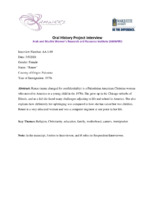 Interview Renee (name changed for confidentiality) is a Palestinian American Christian woman who moved to America as a young child in the 1970s. She grew up in the Chicago suburbs of Illinois, and as a kid she faced many challenges adjusting to life and school in America. She also explains how differently her upbringing was compared to how she has raised her two children. Renee is a very educated women and was a computer engineer at one point in her life.
Interview Renee (name changed for confidentiality) is a Palestinian American Christian woman who moved to America as a young child in the 1970s. She grew up in the Chicago suburbs of Illinois, and as a kid she faced many challenges adjusting to life and school in America. She also explains how differently her upbringing was compared to how she has raised her two children. Renee is a very educated women and was a computer engineer at one point in her life. -
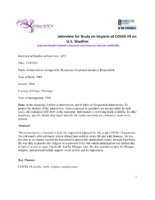 Interview This transcription is focused on how the respondent adjusted his life to the COVID-19 pandemic. His job wasn’t affected much, which offered him stability in his life and with finances. He was not able to see family outside his household in person but maintained contact through FaceTime. He was able to practice his religion on a personal level, but virtual participation was limited due to lack of access to apps, Facebook, that his Mosque used. He also touched on how his Mosque, religion, and personal beliefs support social justice and its importance.
Interview This transcription is focused on how the respondent adjusted his life to the COVID-19 pandemic. His job wasn’t affected much, which offered him stability in his life and with finances. He was not able to see family outside his household in person but maintained contact through FaceTime. He was able to practice his religion on a personal level, but virtual participation was limited due to lack of access to apps, Facebook, that his Mosque used. He also touched on how his Mosque, religion, and personal beliefs support social justice and its importance. -
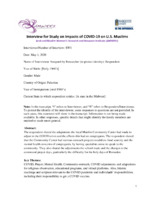 Interview The respondent shared the adaptations the local Muslim Community Center had made to adjust to the COVID crisis and the effects this had on congregants. The respondent shared that the Community Center had various outreach projects to address food scarcity and the mental health concerns of congregants, by having specialists come to speak to the community. They also shared the adjustments the school made and the changes to the communal prayer days, particularly the difficulty for the holy days of Ramadan.
Interview The respondent shared the adaptations the local Muslim Community Center had made to adjust to the COVID crisis and the effects this had on congregants. The respondent shared that the Community Center had various outreach projects to address food scarcity and the mental health concerns of congregants, by having specialists come to speak to the community. They also shared the adjustments the school made and the changes to the communal prayer days, particularly the difficulty for the holy days of Ramadan.
